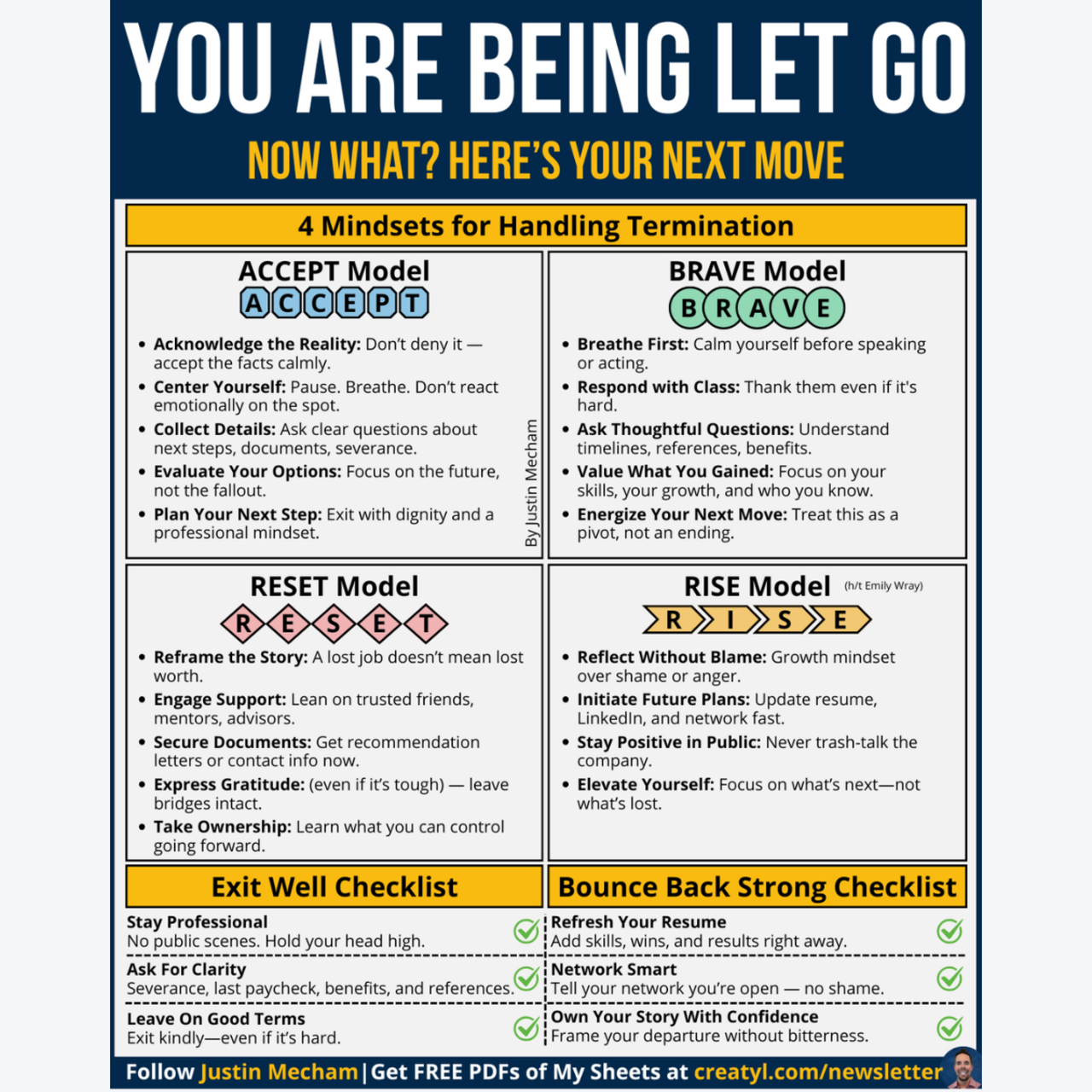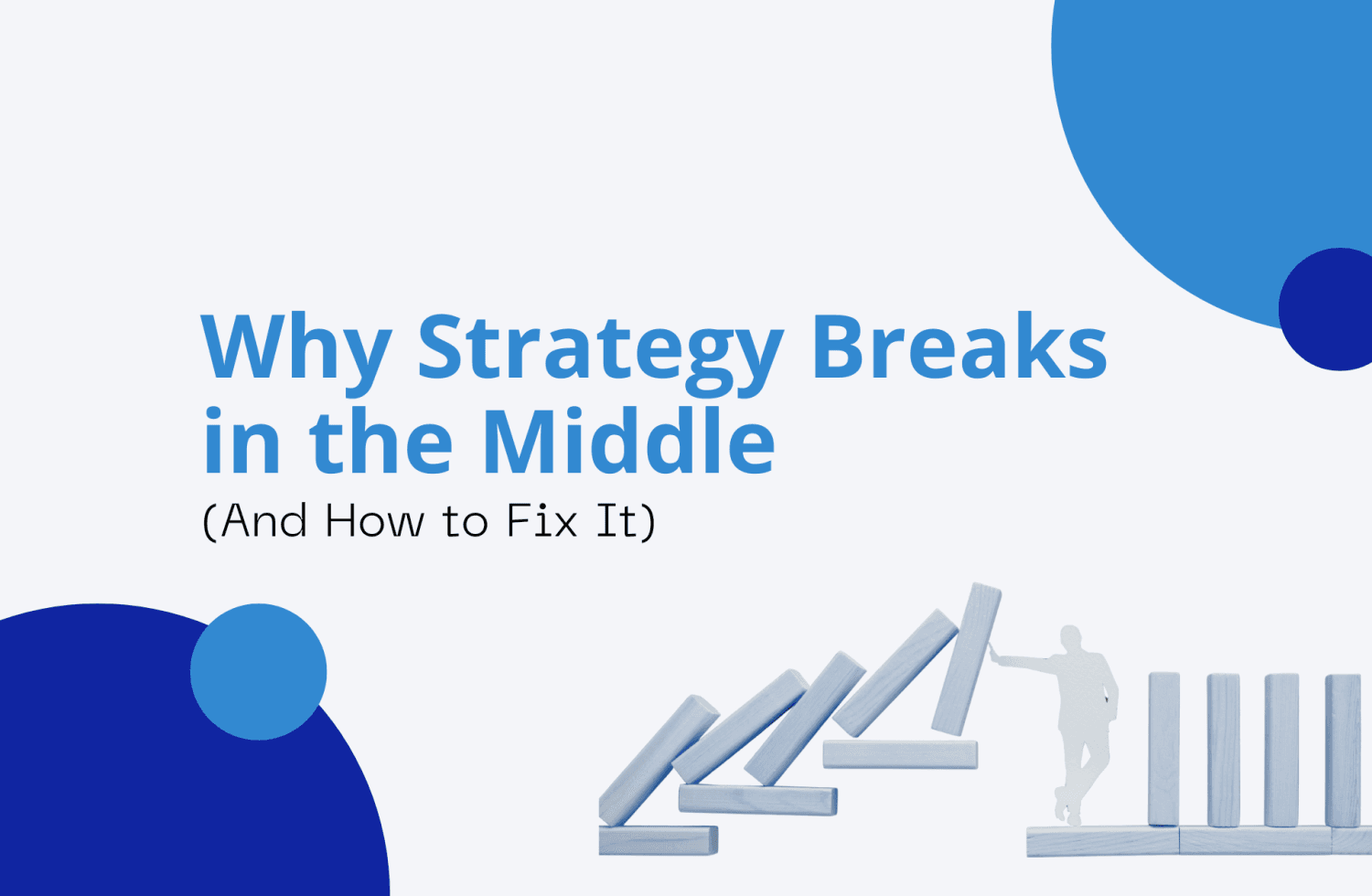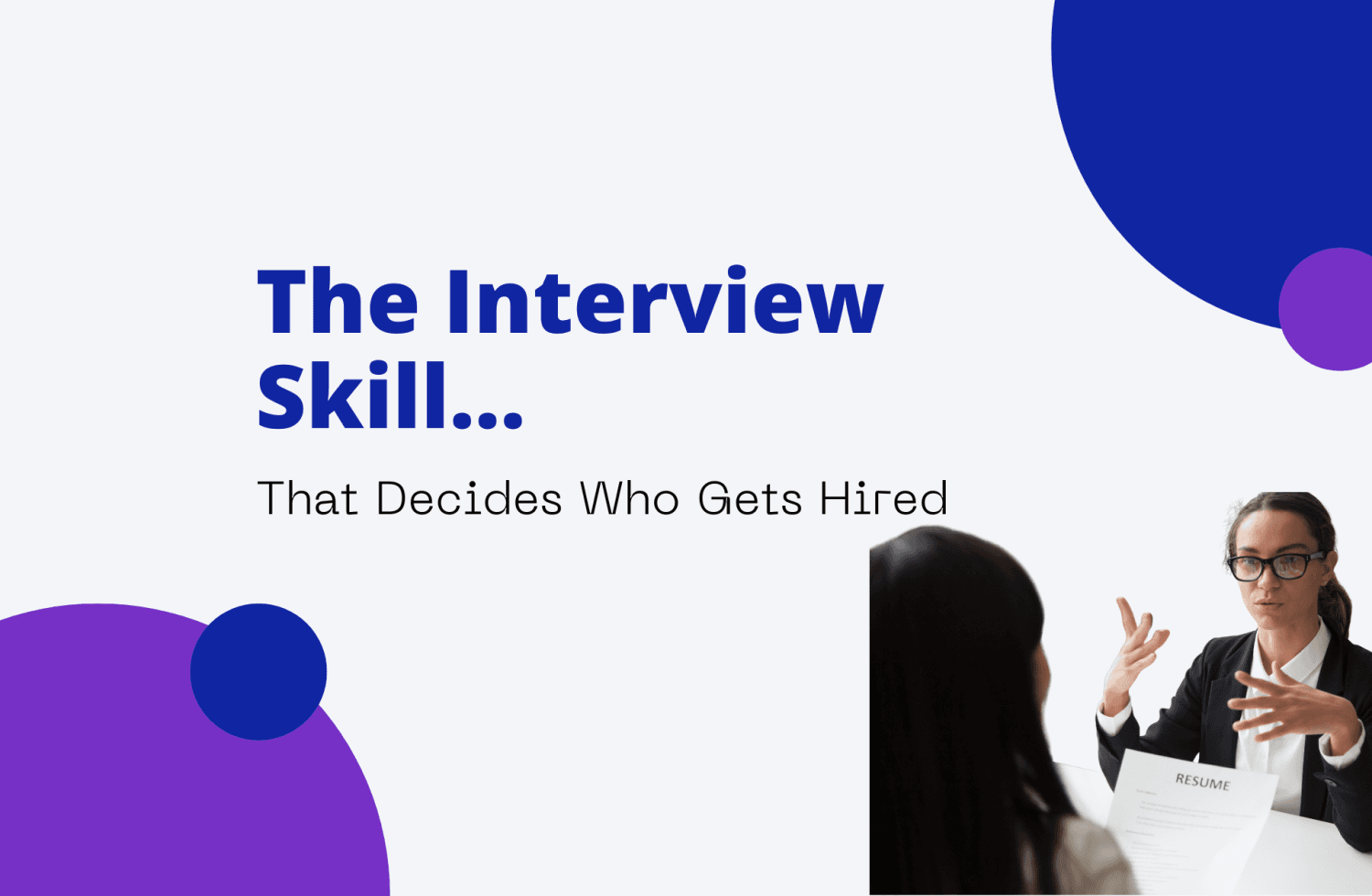Click Here If You Want To Download Today's Infographic as a PDF.
Getting let go can hit like a sharp left turn you didn’t ask for.
Even when you know the job wasn’t quite right anymore—or when you saw the signs—it still lands heavy.
It’s not just about the paycheck.
It’s about identity.
It’s about suddenly being the person who has to tell friends, family, or colleagues, “I’m no longer with the company.”
It’s about having your rhythm interrupted, your confidence shaken, and your sense of direction questioned.
And yet, here’s what’s still true:
You didn’t lose your value.
You didn’t lose your skills.
You didn’t lose your future.
What ended was a role—not your story.
This is not a caption. Not a pep talk.
This is a real guide for the moment you're in—clear, honest, and built to help you get grounded again.
Let’s walk through it step by step.
Most People Freeze. Some Spiral. Few Move with Intention.
When the rug gets pulled out from under you, the brain goes into survival mode.
You pause everything.
You question everything.
You tell yourself you need a week or two to “process,” but you’re also quietly panicking about what’s next.
This is normal. But staying there too long? That’s what keeps you stuck.
The shift happens when you move with intention. Not in a rushed way.
Not because someone says “just update your LinkedIn.”
But because you choose to take back the pen and start writing your next chapter—on your terms.
Here’s how.
The 4 Mindsets for Handling Job Loss Like a Human Being
These aren’t fancy acronyms or quick hacks.
They’re real, grounded mindsets I’ve used with clients—and in my own career—when facing sudden endings.
ACCEPT — Stay Grounded and Clear-Headed
First, acknowledge what happened. Say it plainly:
“The role ended.”
Don’t dress it up. Don’t deny it. Don’t over-explain. That’s where your clarity starts.
Pause. Don’t hit send on that email. Don’t rewrite your whole résumé at midnight.
Give yourself time to catch your breath. Center yourself before reacting.
Then, collect real information:
- What’s your last paycheck?
- Is there severance?
- Can you request a letter of recommendation?
- What benefits continue? For how long?
When you’re ready, evaluate your options.
Not in a rush. Not from fear. But from facts.
Plan one small next step: not your 5-year vision—just your next honest move forward.
BRAVE — Respond with Integrity, Even When It’s Hard
Breathe before you do anything. That moment between hearing the news and reacting? That’s where dignity lives.
Say thank you—even if you don’t feel it yet. Not for their sake. For yours.
It closes the door cleanly and keeps your reputation intact.
Ask thoughtful questions:
- What can I share with the team?
- Who will be my HR contact?
- Can I have time to hand off projects properly?
And most importantly, start seeing this not as failure—but as a pivot.
That word alone can change how this whole experience sits in your body.
RESET — Reframe the Story Without Shame
A job loss doesn’t mean you’re broken.
It doesn’t mean you messed up.
It doesn’t mean you’re less valuable today than you were last week.
It just means that chapter ended.
Find a small circle of people you trust—people who won’t flood you with advice but will give you space to process, reflect, and be real.
Get what you need in writing.
Letters. References. Documents. Anything that helps you move on cleanly.
And if you can, express gratitude. Even one short message to a peer or manager can leave a lasting impression and give you closure.
Then shift into action—not panic. Start with:
“What do I still control right now?”
That question alone can give you your footing back.
RISE — Move Forward with Clarity (Not Chaos)
Reflection is where shame ends.
If you spend all your energy blaming yourself, you miss the point.
Use this time to reset your direction:
- What work do you actually want to do?
- Who do you want to work with?
- What’s no longer acceptable in your next role?
Update your résumé and profile, but only after you’ve taken stock of what you truly want next—not what looks impressive.
Keep your public tone steady. Don’t post something you’ll regret.
You don’t need to prove anything. Just move with quiet strength.
And most importantly—don’t obsess over what ended. Focus on what’s possible now.
Helping a Team Reset in the Middle of a Layoff
Let me share a story from a recent consulting project.
A high-performing team lost one of their key players in a sudden round of layoffs.
It was unexpected. There was no warning.
The team was tight-knit, collaborative, and relied heavily on that person. Once they were gone, everything shifted.
Meetings grew quiet.
People started double-checking every move.
One team member stopped turning on their camera. Another began overworking to “prove” their value.
It wasn’t just the workload—they were rattled.
I started by helping the team ACCEPT what had happened.
We had a short meeting with no agenda except naming the loss and sitting with the discomfort.
We made space to be honest without slipping into venting.
Then we practiced BRAVE:
I encouraged them to write a private message to the teammate who left.
Not to send, just to write. Gratitude, reflection, anything unsaid.
Some did end up sending it. Others just needed the release.
We shifted into RESET:
We listed what needed to be handed off, and who felt ready to step up in a small way—not to cover the loss, but to keep the work moving.
People began supporting each other quietly.
One person even volunteered to run a client call solo for the first time—and nailed it.
Finally, we focused on RISE:
We redefined the team’s direction. Not by pretending nothing happened, but by asking:
“What do we want to be known for now?”
That sentence turned the energy in the room. It gave the team permission to reimagine.
Within ten days, they felt lighter.
Not “over it.” Just more in control.
More connected. More focused on what still mattered.
And that’s what moving with intention looks like.
The Best Tools to Help You Reset (Without Overwhelm)
If you’re looking for something that doesn’t just tell you what to do—but shows you what’s possible—these three resources deliver.
They’re not generic. They’re not fluffy. They’re actually useful, human, and memorable.
Book: Emotional First Aid by Guy Winch
This is the go-to resource for anyone feeling emotionally bruised after a job loss or rejection.
Guy Winch treats failure, loss, and self-doubt like real wounds—and gives you practical ways to treat them.
Think of it as a guide to patch up your mindset with clarity, not fake optimism.
TED Talk: How I Lost My Job and Found My Fire by Jane Stacey
If you need a moment of shared humanity, this talk delivers.
Jane doesn’t gloss over anything—she speaks honestly about shame, fear, and identity loss. But what shines through is her choice to move forward with small, steady action.
You’ll walk away feeling grounded and a little braver.
Film: Julie & Julia (2009, dir. Nora Ephron)
This might surprise you. But few films show the intersection of job loss, identity crisis, reinvention, and joy quite like this one.
Julie Powell is stuck. Frustrated. Laid off from a job that didn’t fit. She feels like she’s fading.
So she gives herself a personal challenge: cook her way through Julia Child’s cookbook—and blog every day.
It’s messy, funny, vulnerable, and full of that quiet, stubborn hope that lives inside all of us after a door closes.
It’s not about perfection. It’s about showing up—even when no one’s watching yet.
Your Role Ended—Your Story Didn’t
The Deepest Truth Most People Forget After They’re Let Go
It’s easy to make a job loss mean more than it should.
To let it tell you something about your worth. Your talent. Your identity.
But here’s what remains true—no matter what just ended:
Your drive.
Your kindness.
Your skills.
Your integrity.
Your story.
None of that gets erased just because a title did.
You’re allowed to feel hurt.
You’re allowed to take time.
But don’t forget: the fact that something ended doesn’t mean you failed.
It means you get to choose again—with more clarity than before.
The most meaningful chapters in your story are rarely the ones that go smoothly.
They’re the ones where something broke open—and you decided to show up anyway.
You didn’t lose your worth.
You simply reached the edge of one chapter.
Now, you get to write what comes next.
And it gets to be entirely yours.
Want a Clear Reminder of What to Do Next?
In tough moments, it’s easy to forget what matters.
That’s why I created a visual guide that breaks down these four mindsets (ACCEPT, BRAVE, RESET, RISE) along with two practical checklists—so you can keep your focus, protect your confidence, and plan your next move.
Download the full PDF version of the infographic here:
Print it. Keep it. Share it with someone who needs it.
And let it remind you: this ending doesn’t get to define you.
-
Justin





